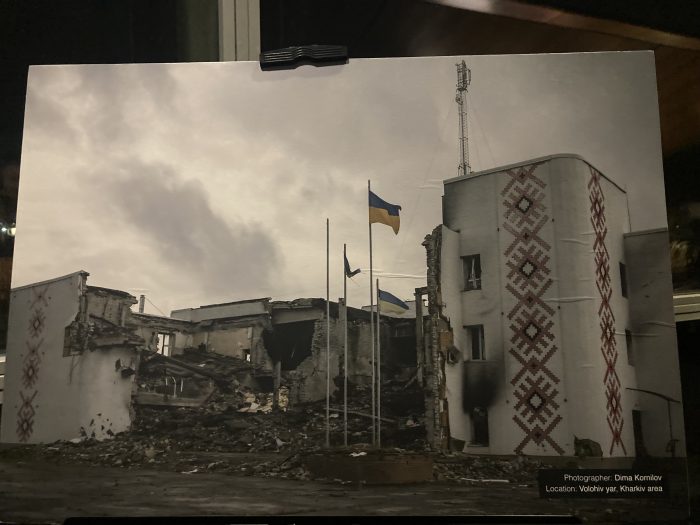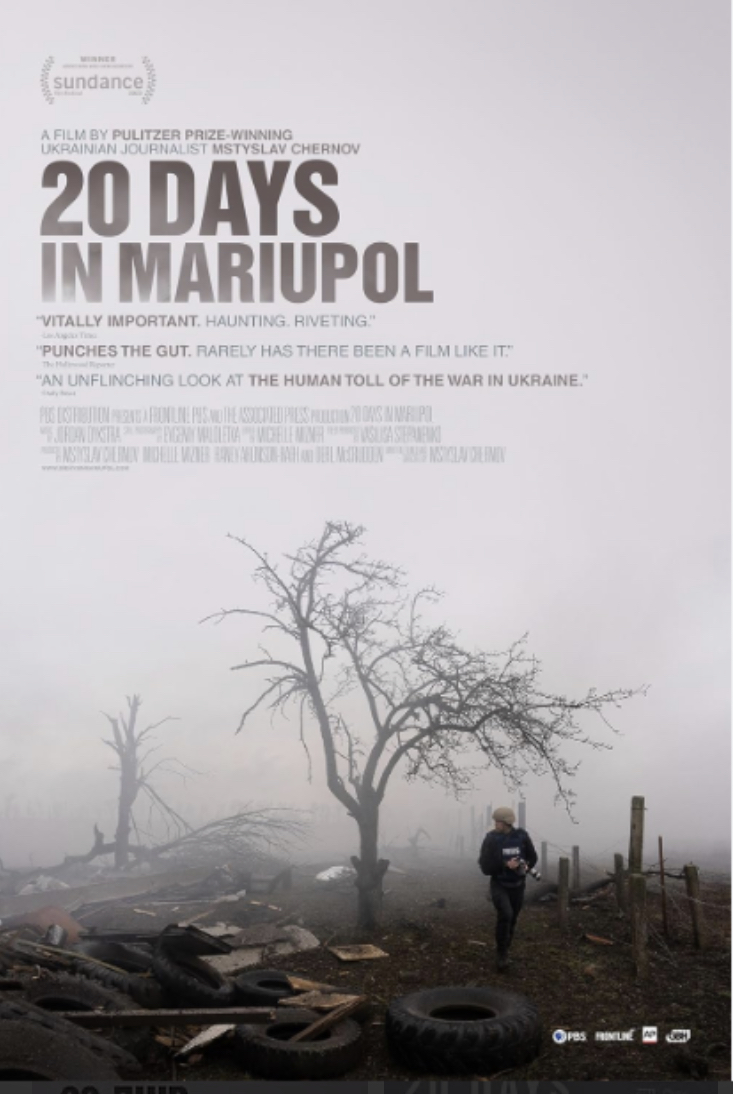I lasted maybe 10 minutes into “20 days of Mariupol” before the tears poured. Day 4 I think they had got to.
As the journalists who chose to stay in Mariupol, Ukraine film a hospital, an ambulance arrives, transporting a little girl as an unyielding medic does CPR. The doctors beg the cameras to follow them inside, and as a team of weeping medics work to save this child’s life, one surgeon stares down the camera: “Film how these motherf—— are killing civilians. Show this Putin bastard the eyes of this child and all these doctors who are crying. Show it.”
“It’s good that there’s press here. Keep filming.”
She doesn’t make it. “Evangilina, age 4” the voice over shares.
“20 days in Mariupol” was filmed almost two years ago by Associated Press journalists Mstyslav Chernov and Evgeniy Maloletka , who stayed in the Ukrainian border city for 3 weeks after the outbreak of the full scale invasion on Ukraine. Despite dire conditions in the city, Russian forces closing in from all sides, and their families waiting for them in safety, the Ukrainian journalists chose to stay and record as much footage as possible to ensure the world could see what was happening in their country. As Chernov says near the end of the film, “And yet as we drive away I keep thinking about all the people whose tragedies will remain unknown.”
The documentary follows the journalists as they record the tragedies of Mariupol, creating an historical record of the events of February 2022, a record that many hope may one day be used as evidence in war crime trials. For now though the film is the front runner for Best Documentary at the 96th Academy Awards, having already won the prize at the Baftas. It was also screened ahead of the opening of the 78th United Nations General Assembly, and was on Friday night screened exclusively to students, staff, and residents of the City of York.
This documentary is a shocking depiction of the real world and real war, and method of hassling its viewers out of the apathy that starts wars and into the shaking fury and heartache that ends them.
Kaitlyn Beattie-Zarb
In an event organised by the University of York Ukrainian Society, the harrowing documentary was shown at the City Screen Picturehouse, preceded by an exclusive photography exhibition called ‘Wounded Land’. The shocking images – which ranged from portraits of destroyed buildings to children’s shoes sitting in rubble – included work from a range of Ukrainian photographers, including Alex Zakletsky, Eduard Kryzhanovsky, Yevhenii Zavhorodnii, Yan Dobronosov, Dima Kornilov and Anatoliy Rabizo.
Treated to blue cupcakes decorated with Ukrainian flags, we were then heralded towards our seats in a packed out cinema, and the film began. Although I don’t believe many of us in that room actually knew what we were in for.

There’s not a lot of words to describe “20 Days In Mariupol”. In fact there’s a reason why images, both still and moving, are needed to tell this ongoing tale. Some things just can’t be explained by the English or Ukrainian language. The film at times feels like an action movie, a horror movie, a medical drama and a personal essay, all rolled up into one heartbreaking truth. It is harrowing, shocking, and debilitating to watch these images – images of death, fear, anger, and mad panic – and know that such horrors may still be ongoing… are still ongoing.
It’s hard to watch. It’s like watching hell on earth. And yet it’s so so important. This documentary gives vital insight into those images that plastered our screens in the early days of war – one particular image of a pregnant woman hit by shrapnel whilst in a maternity hospital is instantly recognisable by almost everyone who saw a news channel in March 2022. “20 Days in Mariupol” shares the stories behind those global images, the great strings journalists took to capture those images and more importantly, to get the footage OUT of Ukraine and onto news networks. It fills in the details, and returns a most necessary human element to the proceedings of war that initially shock, then scare, and finally ‘bore’ us.
This is not a criticism of humanity, it’s the truth. War is hard to watch… and it is human nature to look away after a while. It’s why it’s so hard to watch this 90 minute documentary, a film that transports viewers into the streets of Mariupol, and never lets you unsee it.
At one point Chernov notes this element of human nature: “My brain will desperately want to forget all this, but the camera will not let it happen.”
And yet, whether humans truly ‘remember’ even filmed footage is unclear. Reflecting on the 8 years of conflict that preceded the commencement of full scale invasion of Ukraine, Chernov elaborates; “We keep filming and things stay the same.”

The film ends with these essential journalists narrowly escaping Russian capture at the only remaining hospital in the city. Concerned about the rumored tactic that Russian’s will force the journalists to claim all their previously released footage as fake, the pair race to catch a Red Cross convoy that’s leaving the city. Required to abandon the thousands of injured and dying civilians and hard working medics in order to salvage the footage of their stories, as internet and phone reception is cut off, the doc ends on a joint note of both horror and hope. That the footage will be shared. That the world will pay attention. That Mariupol will be saved.
As one migrating Ukrainian civilian shrugs earlier in the film – “What are you going to do, they’re shooting, I’m walking.”
Of course, as the filmmakers remind us, Mariupol was not saved. It fell to Russian forces on Day 68 of the invasion, with at least 25 000 people falling with it. Civilians, children, and babies too.
On this devastating endnote our cinema was silent. All throughout the credits our cinema was silent. During Ukrainian Society President Ira Lebega’s speech the cinema remained silent, until it finally burst into applause. This shared experience of shock and second hand trauma touched everyone in the room, and has touched everyone who has watched this film in the year since its release at Sundance Film Festival. Hopefully it touched those who watched it at the UN General Assembly too.
During the film, police captain Valdimir states “Wars don’t start with explosions, they start with silence.” It’s brutal and it’s true. But the silence that took over our cinema last week on the eve of the 2 year anniversary of invasion was not apathy, or ignorance. It was not uncaring.
It was a trembling silence, horrified at what we’ve seen, and what the world has become.
“Wars don’t start with explosions, they start with silence.”
Police Captain Validimir
As Ira shared with me as I exited the screen – professional as always in the farewelling everyone of her guests – “I’m shaking”.
I was shaking too. I shook all the way to the bathroom, where the tears exploded once again, barely able to thank Ira, and certainly unable to properly interview the team of the Ukrainian Society over their hugely successful event (And if you know me you know I’ve never had a problem getting an interview).
This documentary is a shocking depiction of the real world and real war, and method of hassling its viewers out of the apathy that starts wars and into the shaking fury and heartache that ends them. Not only does this film vehemently deserve to win the Oscar next month, but it, and the people of Ukraine, deserve our long-standing attention. As do the people of Gaza.
Just as does any place where lives are being unnecessarily spilled, dreams unnecessarily destroyed, and entire cities flattened in unnecessary, unjustified war. Pain and suffering anywhere is pain and suffering everywhere, and we cannot allow whole countries or cities to fall as Mariupol fell.
Aid must always get in. Civilians must always get out. Journalists must always be allowed to transmit the footage of suffering for the world to see. Always.
And on this 2nd anniversary of full scale invasion, the world must not forget Mariupol.

Thank you to the Ukrainian Society for screening this film and drawing so many eyes of York to the pain of your country. It’s not an deasy task, but you constructed a phenomenal event, and a necessary insight into the world of war and the necessity to pay attention once more.
“20 Days in Mariupol” is available to rent on all digital platforms or in select cinemas ahead of the March 11th Academy Awards. If you’d like to assist the Ukrainian Society in raising funds for Ukrainian citizens affected by war, donations are being collected for Superhumans Centre: https://superhumans.com
